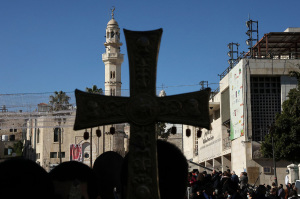U.S. Kills Top Militant Figure in Pakistan's Tribal Areas
Salam al Laibi was considered “religious guide” of al-Qaida terrorists fighting US forces in Afghanistan
As the Taliban have unleashed a violent spate of bombings in Pakistan and Afghanistan to avenge the killing of al-Qaida supreme leader Osama bin Laden, the terrorist organization has lost a high-profile religious figure, Salim al Laibi in a recent U.S. drone attack in the town of Mirali in Pakistan’s North Waziristan Agency, according to reports from the area bordering Afghanistan and considered to be a stronghold of al-Qaida and Taliban militants fighting the U.S. and NATO forces in Afghanistan.
“Salam al Laibi was amongst the 12 militants killed in the U.S. drone attack in Khushhali Torikhel near Mirali on May 16,” an informed government source has claimed.
Usman, the son of another al-Qaida top commander Abu Akasha, was also killed in the same attack, said the source, adding that he was Abu Akasha’s third son to be killed in a U.S. drone strike.
According to the source, al Laibi was counted among top al-Qaida leaders and was a Mufti by status and responsible for the “religious guidance” of al-Qaida terrorists fighting against the U.S. forces in the region. Intelligence sources privy to the working of al-Qaida and Taliban militants sheltering in North Waziristan have also confirmed al Laibi’s death.
After Yahya al Laibi, Abu Akasha is considered to be the second-most important al-Qaida figure in Waziristan. There has been no respite in Taliban attacks since bin Laden’s killing as a bomb attack on a NATO fuel tanker headed to Afghanistan on Saturday sparked a huge fire that killed 15 people who had been scrambling to collect petrol leaking out from the bombed-out vehicle.
The attack came hours after the Taliban bombed a U.S. consulate convoy in Peshawar on Friday, killing one person and wounding 11 others in the first such attack on Americans in Pakistan since the al-Qaida chief’s death on May 2.
"The oil tanker caught fire after a blast caused by a small bomb before dawn," an official told reporters, noting that the fire was initially put out before villagers rushed from nearby houses rushed and started collecting fuel from the tanker.
"Suddenly the fire erupted again and at least 15 people including five young boys who had been collecting oil in their buckets were burnt to death," he said.
Earlier, 11 other NATO supply vehicles, "most of them oil tankers" were destroyed at a terminal in nearby Torkham town, another administration official, Iqbal Khattak told reporters, but there were no casualties.
"The vehicles caught fire after a blast in one of the tankers around midnight," he said, adding that the explosion was apparently caused by a remote-controlled device placed under one of the parked vehicles. The Pakistani Taliban have threatened further attacks against Western targets in telephone calls to media offices.
"Our first enemy is Pakistan, then the United States and after that, other NATO countries," Taliban spokesman Ehsanullah Ehsan had told journalists in telephone calls after the attack on the U.S. consulate vehicle on Friday.
The United States leads a NATO force of around 130,000 foreign troops in Afghanistan that is trying to put down a 10-year Taliban insurgency. Pakistani logistical and military support is considered vital to the war effort. Most supplies and equipment required by foreign troops in Afghanistan are shipped through Pakistan. Taliban and al-Qaida-linked militants frequently launch attacks across northwestern Pakistan and the lawless tribal belt on the Afghan border.
Washington has been pressuring Islamabad to launch a full-fledged military operation against militants holed-up in the North Waziristan Agency but according to reports, Pakistan’s efforts to bring the feared militant group – the Haqqani network – and U.S.and Afghan authorities to the negotiations table have failed as Washington is not receptive to the idea because it thinks the militant faction is too close to al-Qaida, unlike other Taliban groups.
In the wake of bin Laden’s killing in Abbottabad, the U.S. is pushing Pakistan afresh, and very strongly for a military offensive against the Haqqani network, which it believes is the most influential militant group but difficult to win over because of its closeness to al-Qaida. The network, which operates from North Waziristan, is blamed for several suicide bombings and acts of sabotage in Afghanistan against the U.S.-led foreign troops and Afghan National Army, including a deadly attack on the Central Intelligence Agency’s forward operating base in Chapman, Khost province, in which seven operatives of the U.S. spy agency were killed.
The Americans believe that the Haqqani network, which is led by Sirajud Din Haqqani, son of veteran militant commander Jalalud Din Haqqani, cannot be separated from al-Qaida, and hence talking to them is no use. Similarly, the Haqqanis too are not in any rush to enter into peace talks with the US administration as media reports have started suggesting that the U.S. has finally entered into peace talks with the Mullah Omar-led Taliban, which is the largest insurgent group in Afghanistan.
Pakistan wants a seat for the Haqqanis on the table of negotiations in Afghanistan because it believes that for durable and lasting peace in the war-torn country, the network’s participation is very imperative.
“We don’t have any links with the Haqqani network as alleged by Washington, but we see this group as very influential in Afghanistan and its exclusion from any peace process would not serve the purpose at all,” said a senior Pakistani security official, requesting anonymity.
When asked whether Pakistan would launch an operation in North Waziristan if the Haqqanis did not respond positively to Islamabad’s pressure or if the U.S. continued to oppose the move, he said there would be no other option but to launch the offensive in that case. He said Pakistan believed the Haqqanis were not in North Waziristan and they had now shifted their bases to Khost and other nearby provinces of Afghanistan after a surge in CIA drone attacks on the restive tribal region.
“However, that tribal area does have many troublemakers, including foreign militants, and an operation would be launched to flush them out,” he said. A fresh military operation in North Waziristan had long been on the cards, he noted, but lack of resources and the Pakistan Army’s preoccupation with other campaigns in various tribal regions had been delaying it.





























